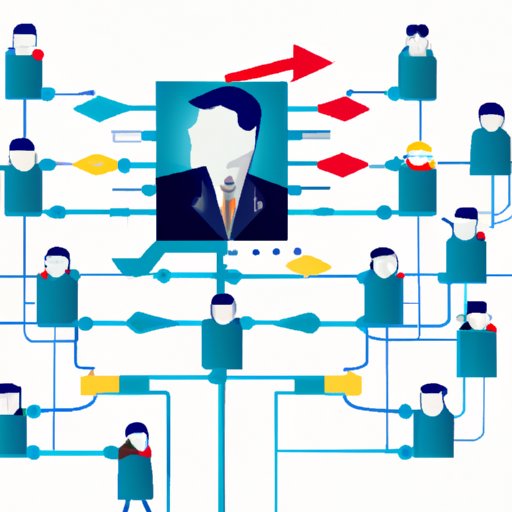Introduction
Organizational culture is a unique blend of values, beliefs, attitudes, and behaviors that define how people interact with each other. It is shaped by the organization’s leaders, who have the power to create a positive or negative atmosphere within the workplace. In this article, we will explore how leadership influences organizational culture and how leaders can use their positions to create an effective and productive environment.

Definition of Leadership and Organizational Culture
Before we examine how leadership affects organizational culture, it is important to understand what each term means. Leadership is defined as the ability to direct, motivate, and inspire others to achieve a common goal. It involves setting a vision for the future, making decisions, and providing direction for the organization.
Organizational culture is the shared values, beliefs, and attitudes that characterize an organization. It is the collective identity of the organization and defines how its employees think, feel, and act. It is shaped by the organization’s mission, vision, and values, as well as its history and traditions.

Overview of How Leadership Influences Organizational Culture
It is clear that leadership has a profound impact on organizational culture. Leaders set the tone for the organization and have the power to shape its values, norms, and expectations. They are responsible for creating an environment where employees feel valued and empowered to do their best work. Furthermore, they play a key role in motivating and inspiring employees to reach their full potential.
Examining the Impact of Leadership on Organizational Culture
The Role of Leaders in Shaping Organizational Culture
Leaders are responsible for setting the tone for the organization and creating an environment that promotes productivity and innovation. They do this through their interactions with employees, their decisions and actions, and their overall leadership style. By setting clear goals and expectations and providing guidance and support, leaders can foster an environment in which employees feel valued and motivated to do their best work.
Exploring How Leadership Styles Affect Organizational Culture
Leadership styles also play a major role in shaping organizational culture. Different styles can have different impacts on the organization. For example, a leader who is authoritarian may create a culture of fear and obedience, while a leader who is collaborative and empowering may create an environment of trust and creativity. It is important for leaders to be aware of the impact their style can have on the organization and to strive to create an environment that encourages collaboration and innovation.

Investigating the Relationship Between Leaders and Organizational Culture
Assessing the Influence of Leadership on Organizational Climate
Organizational climate is an important factor in determining the success of an organization. It is the collective attitude of the organization and is affected by the organization’s culture, structure, and processes. Leaders are responsible for creating a climate that encourages collaboration, creativity, and productivity. This can be done by setting clear goals and expectations, providing guidance and support, and encouraging open communication.
Analyzing the Correlation Between Leadership and Organizational Culture
There is a strong correlation between leadership and organizational culture. The values, beliefs, and attitudes of the organization’s leaders shape the culture of the organization. Leaders set the tone for the organization and have the power to create an environment that encourages collaboration, creativity, and innovation.
Understanding How Leaders Shape Organizational Values and Norms
Examining How Leaders Set the Tone for Organizational Culture
Leaders play an important role in setting the tone for the organization. They are responsible for creating an environment in which employees feel valued, respected, and empowered to do their best work. Leaders can do this by fostering an open and trusting atmosphere, encouraging collaboration, and recognizing and rewarding employees for their contributions.
Identifying Ways Leaders Can Foster an Effective Organizational Culture
Leaders can foster an effective organizational culture in a number of ways. They can focus on building strong relationships with employees and creating an environment of trust and respect. They can also encourage open communication and collaboration, provide meaningful feedback and recognition, and create opportunities for employees to grow and develop.
Conclusion
In conclusion, leadership plays a critical role in developing and maintaining an effective organizational culture. Leaders set the tone for the organization and have the power to shape its values, norms, and expectations. They are responsible for creating an environment where employees feel valued and empowered to do their best work. By understanding the impact of leadership on organizational culture, organizations can ensure that their cultures are conducive to collaboration, creativity, and innovation.
(Note: Is this article not meeting your expectations? Do you have knowledge or insights to share? Unlock new opportunities and expand your reach by joining our authors team. Click Registration to join us and share your expertise with our readers.)
